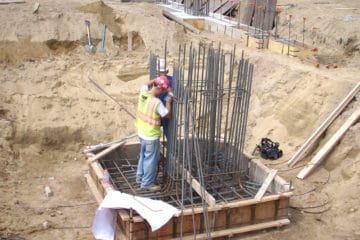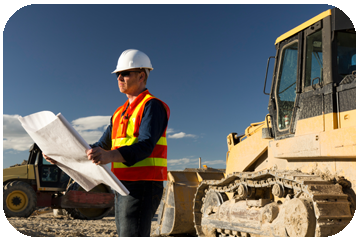The Function of an Engineer of Record in Ensuring Structural Stability and Conformity
The Function of an Engineer of Record in Ensuring Structural Stability and Conformity
Blog Article
The Interdisciplinary Approaches in the Geotechnical Industry: Linking the Space Between Design, Geology, and Environmental Scientific Research for Optimal Project End Results
The assimilation of design, geology, and ecological science within the geotechnical sector is not just helpful; it is necessary for attaining ideal task end results. What strategies might emerge to facilitate this crucial partnership and boost the effectiveness of geotechnical methods?
Importance of Interdisciplinary Partnership
The value of interdisciplinary collaboration in the geotechnical sector can not be overstated. Reliable geotechnical tasks require the assimilation of varied competence from various fields, including engineering, geology, and environmental science. This partnership guarantees that all elements of a job are thought about, resulting in comprehensive remedies that address complicated obstacles.
Interdisciplinary cooperation promotes innovation by allowing specialists to share understandings and techniques that might not be noticeable when functioning in isolation (consulting engineer). By leveraging the staminas of numerous disciplines, groups can identify potential threats, maximize style processes, and enhance the sustainability of geotechnical jobs. In addition, such collaboration promotes an alternative understanding of site-specific problems, which is vital for accurate analysis and decision-making.
The intricacy of geotechnical tasks requires a collaborated strategy to problem-solving. Eventually, interdisciplinary partnership is vital for advancing ideal practices and attaining quality in the geotechnical sector.
Secret Roles of Each Technique
Cooperation among different disciplines is not just valuable; it is crucial for the successful execution of geotechnical tasks. Each self-control-- engineering, geology, and ecological science-- plays an unique yet interconnected duty that adds to project efficacy and sustainability.
Geotechnical engineers are largely liable for designing foundations and making certain architectural stability. They evaluate soil and rock buildings to examine load-bearing capabilities, giving vital data for safe construction techniques. Their know-how allows the formulation of ingenious services to intricate difficulties.

Ecological researchers evaluate the potential influences of building and construction on ecological communities and water sources. They carry out ecological assessments and create reduction methods to lessen unfavorable impacts. By incorporating eco-friendly factors to consider, they make certain compliance with guidelines and promote sustainability throughout the project lifecycle.
Study of Effective Combination
Successful combination of geotechnical techniques can be exhibited through different case researches that highlight the performance of teamwork in dealing with complicated design challenges. One noteworthy instance is the building and construction of the Hong Kong-- Zhuhai-- Macau Bridge, where a collective method entailing geotechnical engineering, geology, and ecological scientific research was crucial. Rock hounds and designers operated in unison to evaluate the seabed problems and optimize the structure design, making sure security and minimizing environmental impact.
One more impactful situation is the renovation of incline security in the San Francisco Bay Area, where an interdisciplinary team integrated geotechnical analysis with ecological evaluations. By incorporating geological surveys and hydrological research studies, the group effectively identified possible landslide risks and applied reliable mitigation actions, boosting safety and sustainability.
Additionally, the redevelopment of Brownfield websites typically needs a multidisciplinary method. In one case in Chicago, partnership amongst geotechnical designers, ecological scientists, and metropolitan planners resulted in the effective removal of infected soil, permitting for the secure transformation of the site into a neighborhood park. These study highlight that interdisciplinary cooperation not only addresses technical challenges yet also promotes ingenious services that benefit both communities and jobs.
Obstacles in Multidisciplinary Projects

In addition, working with timetables and process among numerous groups can be bothersome, especially when each technique has distinct task turning points and deliverables. This imbalance can cause delays and enhanced prices. The difficulty of resource allotment likewise looms big; making certain that customized proficiency is available at crucial junctures calls for careful planning and foresight.
Finally, regulatory compliance postures one more considerable challenge. Each discipline might deal with various regulative structures, and aligning these demands to fulfill job goals can be complex and time-consuming. Addressing these obstacles requires solid management and reliable communication techniques to promote partnership and ensure that multidisciplinary teams function cohesively in the direction of shared goals.
Future Trends in Geotechnical Practices
As the geotechnical market progresses, arising fads are reshaping practices to deal with the difficulties faced in multidisciplinary jobs - tailings engineer. One significant trend is the boosted combination of advanced technologies, such as artificial knowledge and device discovering, right into geotechnical evaluation and design. These modern technologies enhance anticipating modeling and danger analysis, enabling designers to make even more informed decisions throughout the project lifecycle

Moreover, the fostering of digital doubles and real-time monitoring systems is coming to be much more prevalent. These tools help with ongoing assessment of dirt problems and architectural efficiency, permitting timely treatments when issues emerge.
Verdict
In final thought, the assimilation of engineering, geology, and ecological science is crucial for achieving ideal results in the geotechnical market. Interdisciplinary partnership promotes innovation, improves analytical abilities, and aligns technical needs with ecological sustainability. Effective study illustrate the benefits of this technique, while acknowledging the obstacles dealt with in multidisciplinary jobs. Looking in advance, welcoming these collective techniques will certainly be essential for browsing future trends and advancing the field of geotechnical engineering.
The combination of design, geology, and ecological scientific research within the geotechnical sector is not just advantageous; it is geotechnical engineers vital for achieving ideal project results. Reliable geotechnical tasks call for the assimilation of varied proficiency from different areas, consisting of engineering, geology, and environmental science.Navigating the intricacies of multidisciplinary jobs in the geotechnical industry provides a number of significant challenges.As the geotechnical market develops, arising fads are improving techniques to resolve the challenges encountered in multidisciplinary jobs. Geotechnical engineers are increasingly working together with ecological researchers to guarantee that jobs straighten with sustainability objectives and comply with governing demands.
Report this page